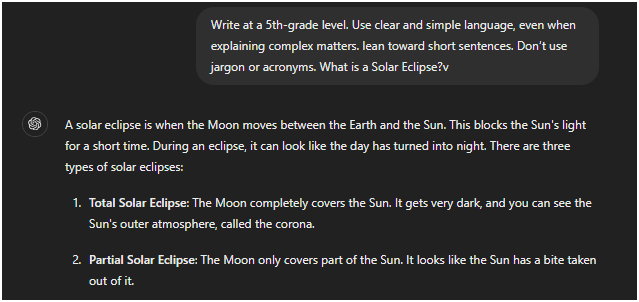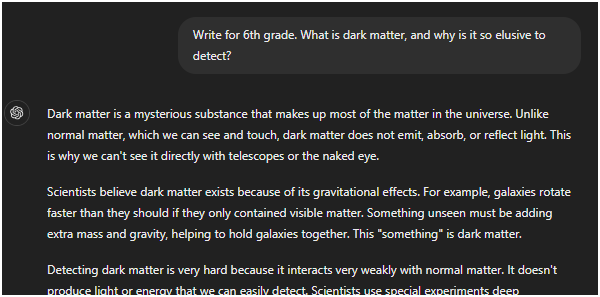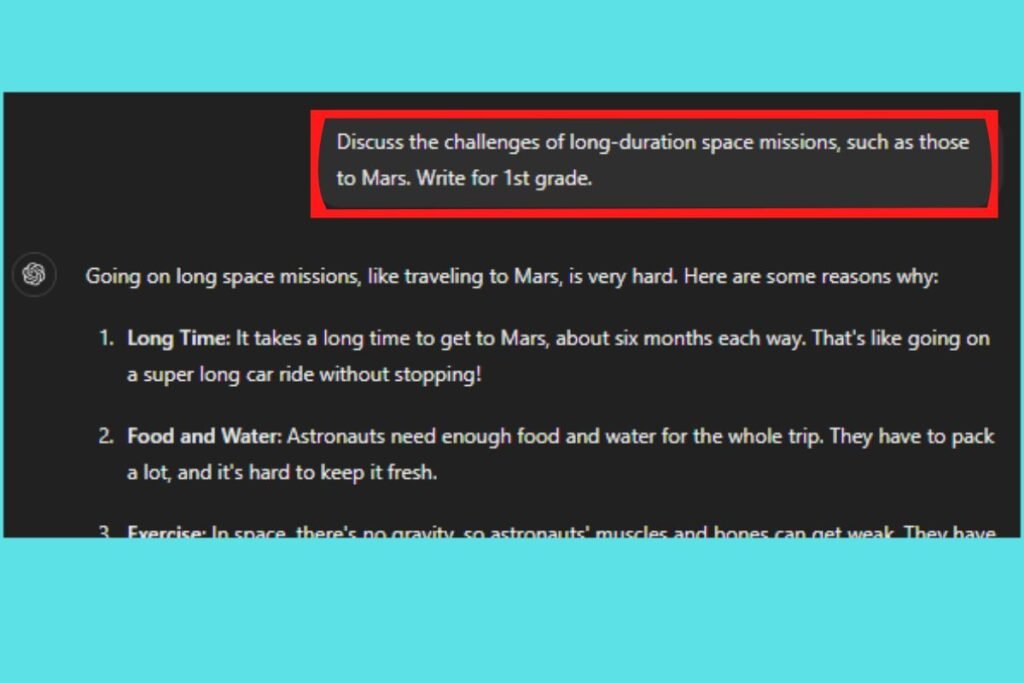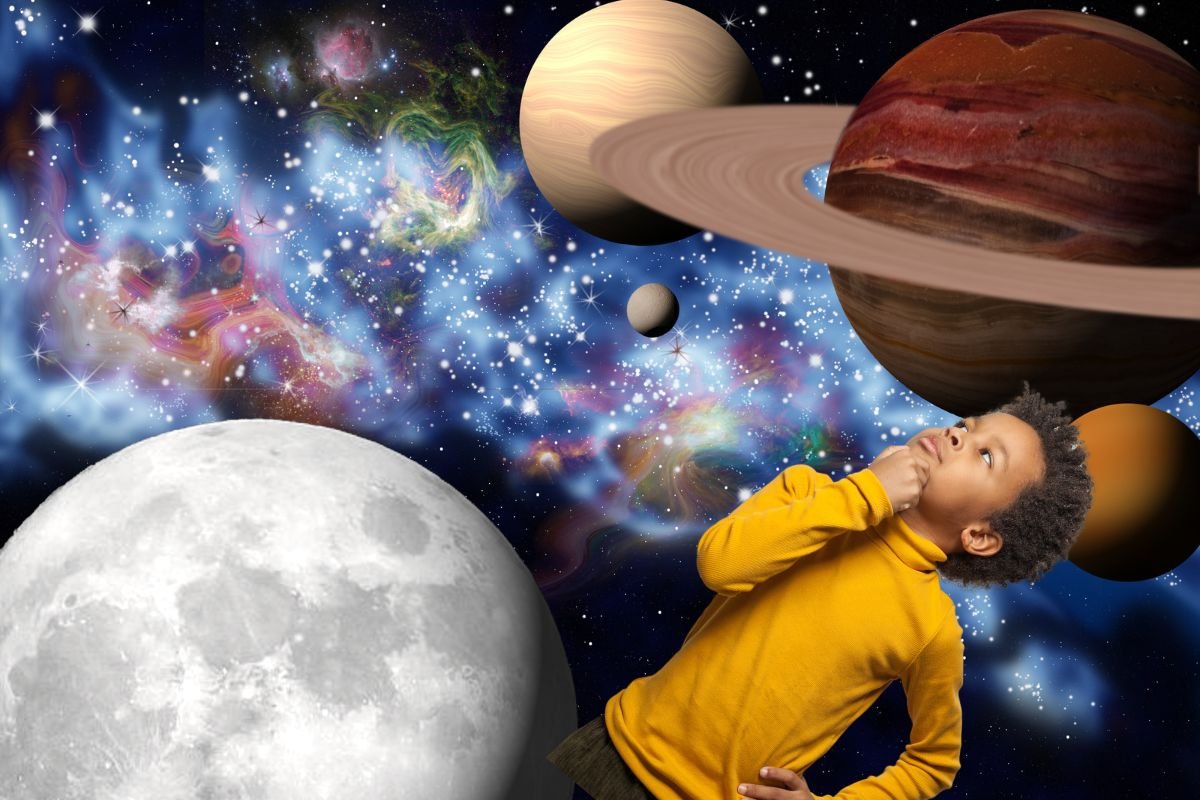Hey there, fellow space enthusiast! If you’ve ever found yourself gazing up at the night sky, captivated by the twinkling stars and the mysteries they hold, then you’re in for a treat.
Welcome to a cosmic journey where we’ll dive deep into the vast expanse of space, exploring galaxies, stars, black holes, and everything in between.
So, buckle up and get ready to embark on an adventure that’s truly out of this world!
To discover space, you must buy and read tons and tons of books, articles, and research papers. These are expensive and time-consuming, up to some extent impossible too.
But AI makes it possible! Stay curious about SPACE.
AI ChatBots(ChatGPT, Perplexity AI etc) are the ALL-IN-ONE place ‘Answer Engine’ for any query.
Most interestingly, it is free to use and you can learn at your own pace.
But, chatbots can make mistakes!
You must write the correct prompt in the chat bar to get accurate and precise output.
Don’t worry I am here to help you.
In this blog post, I shared 50+ Ready-Made ChatGPT prompts to unfold the mysteries of ‘SPACE ’ for YOU, all are tested and refined.
50+ ChatGPT Prompts to Explore the Mysteries of Space
Prompt A:
Write at a 5th-grade level. Use clear and simple language, even when explaining complex matters. lean toward short sentences. Don’t use jargon or acronyms. What is a Solar Eclipse?

Prompt B:
Format your response using markdown. Use headings, subheadings, bullet points, and bold to organize the information. What is a Solar Eclipse?
Replace ‘What is a Solar Eclipse?’ with the following prompts one by one and cool down your curiosity. Also, mention your grade for better output.
The two GREAT qualities that make humans different from other animals are 1. Observation Power and 2. Questioning Power.
A ‘Curious Mind’ becomes a ‘Smart Mind.’
Let’s explore the following prompts!
1. What is the Big Bang theory, and how did it shape the universe as we know it today?
2. Can you explain the concept of black holes and their role in the cosmos?
3. How do stars form, and what determines their lifespan?
4. What are galaxies, and how are they classified?
5. What is dark matter, and why is it so elusive to detect?
Prompt:
Write for 6th grade. What is dark matter, and why is it so elusive to detect?
See the response.

6. Could there be life beyond Earth? Explore the possibility of extraterrestrial life.
7. How do astronomers study distant celestial objects like exoplanets?
8. What causes the phenomenon of a supernova, and what are its implications?
9. Dive into the fascinating world of nebulae and their importance in stellar formation.
10. What are the different types of galaxies, and what sets them apart?
11. How do gravitational waves provide insights into the universe’s most violent events?
12. Explore the concept of time dilation in the context of Einstein’s theory of relativity.
13. What role do asteroids and meteoroids play in our solar system?
14. Explain the concept of redshift and its significance in understanding the expanding universe.
15. What are pulsars, and why are they considered cosmic lighthouses?
16. Discuss the possibility of interstellar travel and the challenges associated with it.
17. How do planetary atmospheres influence their potential for harbouring life?
18. What are the different stages in the life cycle of a star, from birth to death?
19. Explore the concept of multiverse theory and its implications for our understanding of reality.
20. What is the cosmic microwave background radiation, and what does it reveal about the early universe?
21. Discuss the concept of time travel and its feasibility according to current scientific theories.
22. What are exoplanets, and how do scientists identify potentially habitable ones?
23. How do gravitational lenses offer insights into the distribution of dark matter?
24. Explore the concept of wormholes and their hypothetical use for space travel.
25. What are the different types of space missions conducted by space agencies around the world?
26. Discuss the importance of space telescopes like Hubble in advancing our understanding of the cosmos.
27. What are the key components of the Milky Way galaxy, and where does the solar system reside within it?
28. How do astronomers measure the distances between celestial objects in space?
29. Explore the concept of terraforming and its potential for making other planets habitable.
30. What role do magnetic fields play in shaping the dynamics of celestial bodies?
31. Discuss the concept of the Goldilocks zone and its significance in the search for extraterrestrial life.
32. How do planetary rings form around gas giants like Saturn?
33. What are the potential consequences of a large asteroid impact on Earth?
34. Explore the concept of the multiverse and the various hypotheses surrounding it.
35. Discuss the possibility of time dilation during space travel and its implications for astronauts.
36. What are the different types of cosmic radiation, and how do they affect space exploration?
37. How do scientists study the composition of distant planets without directly visiting them?
38. Explore the concept of parallel universes and their relationship with our own.
39. Discuss the challenges of long-duration space missions, such as those to Mars.
PROMPT:
Discuss the challenges of long-duration space missions, such as those to Mars. Write for 1st grade.
Copy and paste the above prompt into the ChatGPT chat bar. Here is the output.

40. What are the potential future technologies that could revolutionize space exploration?
41. How do astronomers detect and study exoplanets orbiting distant stars?
42. Discuss the concept of the “Great Filter” and its implications for the search for intelligent life in the universe.
43. What are the various theories regarding the ultimate fate of the universe?
44. Explore the concept of quantum entanglement and its potential implications for space communication.
45. How do solar flares and coronal mass ejections impact Earth’s magnetosphere?
46. Discuss the phenomenon of space junk and its implications for future space missions.
47. What are the key characteristics of habitable exoplanets, and how do scientists identify them?
48. Explore the concept of the Fermi paradox and the possible explanations for the absence of observable extraterrestrial civilizations.
49. How do scientists study the interior structures of planets without drilling into them?
50. Discuss the role of artificial intelligence in advancing our understanding of the cosmos and guiding future space missions.
Climate Change and Global Warming are burning events. Only knowledge can save mankind.
Conclusion
And there you have it, folks! Fifty captivating prompts to satisfy your curiosity about space and beyond. Whether you’re a seasoned astronomer or simply an amateur stargazer, there’s always something new and intriguing to discover in the vast expanse of the universe. So, keep looking up, stay curious, and who knows what cosmic wonders you might uncover next? Until our next cosmic rendezvous, keep exploring, keep dreaming, and may the wonders of the universe continue to inspire us all. Safe travels through the cosmos!
Thank YOU for staying with us!





